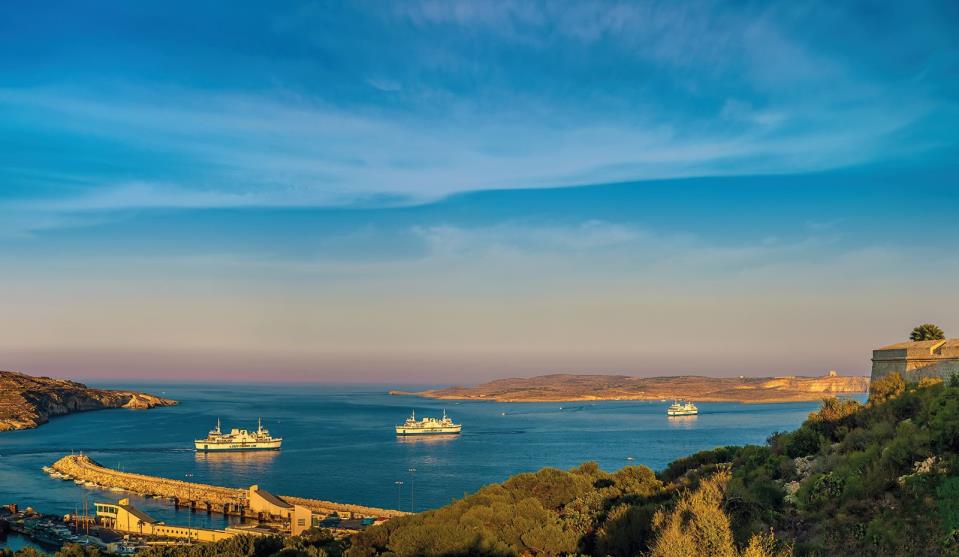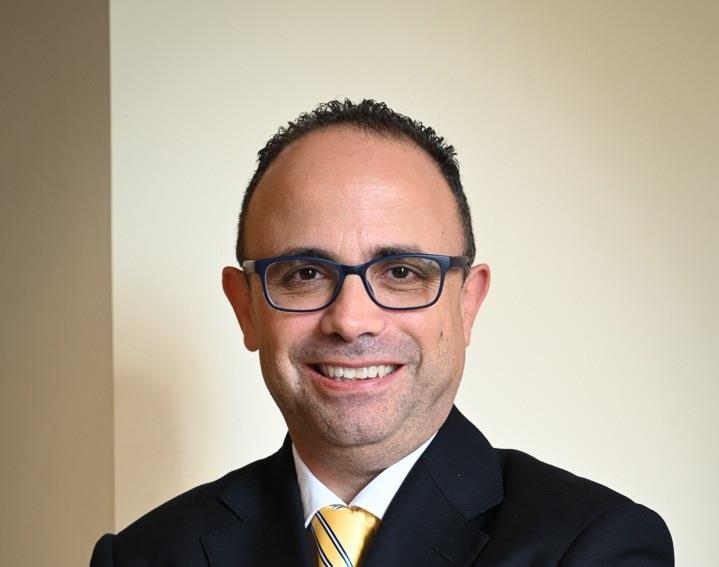Without a permanent link between Gozo and Malta, there should be heavy investment in the vessels that serve as transportation means, and possibly an increase in the fleet of ferries, Daniel Borg, CEO of the Gozo Business Chamber, said.
At present, four vessels regularly operate between the two islands, although there are times when the number is reduced to three when one of the ferries is undergoing maintenance or repair work.
With the idea of having a permanent link – be it a bridge or an undersea tunnel – shelved again, the Chamber is calling on the government to provide a long-term plan and for a decision to be taken on the investment that needs to be made on transport services between the two islands.
In an interview with The Malta Independent on Sunday, Borg said that if the government is to invest in the Gozo Channel fleet, it must start thinking about it now because the three main vessels are now close to being 25 years old.
Given the increase in traffic between the two islands, also as a result of the increase in population and tourism numbers, the addition of a fourth vessel to ply regularly between Mgarr and Cirkewwa was needed. The Nikolaus was leased and added to the Ta’ Pinu, Gaudos and Melita vessels, although the former is used sparingly.
He emphasised that any new vessels that join the fleet must be accessible to everyone and adhere to certain pollution reduction standards. Added to this, there must be an investment in the two ports, those of Mgarr and Cirkewwa, so as to be able to meet with the demand and improve the facilities available.
The Chamber, however, still believes that a certain form of permanent link needs to be constructed, with a tunnel seen as the best option. He referred to underwater tunnels that link the Faroe Islands to facilitate transport, adding that their construction did not "result in excessive development".
"It seems that there is no political will," he lamented when asked why despite being endorsed by both the PN and PL, it was never started.
Speaking of other decisions that need to be made regarding services linking the islands, Borg referred to the Gozo Fast Ferry and emphasised that the timetable needs to become more reliable. He emphasised the problem of gaps in the winter schedule, which can occasionally extend up to four hours.

Main photo and photo above: Daniel Cilia
Tourism in Gozo
Asked about the tourism situation in Gozo, he spoke about significant changes, particularly during the Covid-19 pandemic. He noted the importance of domestic tourism, not only during this time, but even in the pre- and post-pandemic years. Regarding domestic tourism, he mentioned that some people visit Gozo all year round but tend to avoid certain important periods, such as during the Santa Maria feast in August.
Borg noted that the traveller profile is constantly evolving. He said that, overall, travellers are reducing their stay in Gozo but may be increasing the frequency of their visits throughout the year. Regarding foreign travellers to Gozo, he said that the numbers have not yet returned to pre-Covid levels.
With reference to this year's summer expectations, he said that domestic tourism appears to be a consistent trend, remaining stable. With regard to foreign tourism, he noted that at this stage there are many uncertainties, but necessary marketing efforts are underway.
He said that the absence of specific niches in Gozo, such as scuba diving or unique reasons for travelling to the sister island, makes promotion more challenging. Regarding potential sectors that could serve as a "main selling point" on their own, Borg highlighted Gozitan culture. Despite the island's developed cultural calendar, which provides an enriched experience for tourists and locals alike, Borg noted that "these niches take time to build".
Other niches include hiking and walking. Borg emphasised that for these niches to be sustainable, proper maintenance is crucial, such as the cleaning of paths and ensuring full access to hikers. Currently, they encounter certain issues because some of the pathways intersect with private property, thereby limiting accessibility. Borg proposed resolving the issue by implementing a compensation mechanism, wherein the owner of the private property would receive financial compensation in exchange for granting access. Additionally, Borg mentioned that climbing and abseiling were once popular activities, but similar issues arose due to private property concerns.

Property development
Borg noted that over the past years, development in Gozo has not been sustainable, although this year he has noticed a decline in building projects.
"There was excessive overdevelopment," he said.
Borg noted that prior to the government's introduction of a scheme reducing stamp duty on Gozo property purchases from the standard 5% to 2% back in 2017, the property market was stagnant. He mentioned that during this period, other factors, such as the introduction height limitations on buildings, also played a role. Additionally, activists have claimed that developers were exploiting this clause to maximise the number of floors in a single project.
When it comes to property buying, following the introduction of these measures, Borg mentioned that for a long time, Gozo was topping the charts every month. In fact, the highest number of promises of sale agreements in Gozo occurred during the Covid-19 pandemic in 2021, with 2,323 agreements. Borg also highlighted that during this period, the quality of property built decreased as developers squeezed in more floors and rooms wherever they could in their projects.
"The Chamber is not against development but in favour of good and sustainable development," he said.
The Chamber's real estate subcommittee also noted a difficulty in selling properties built during this peak, as such properties lack quality, he said.
Although the Chamber is in favour of the government's removal of the 2% blanket incentive, Borg mentioned that it was also advocating for other measures to replace it. However, following the removal of the incentive, the government did not come up with a replacement. Borg suggested that potential replacement measures could include incentives for property owners who choose to build single houses instead of blocks of flats, or incentives for developers to construct sustainable apartment blocks, thereby promoting quality development.
Borg mentioned that there are other issues, such as the fact that when it comes to planning, Gozo is considered on par with Malta. He explained that the Gozo Regional Development Authority (GRDA) has proposed a paper tailored to Gozo's context. For instance, one of the GRDA's policy proposals is the establishment of a design advisory committee specifically for Gozo.
The PA also issued new design guidelines for Gozo "but more needs to be done".
Following the removal of the 2% incentive, Borg noted that there was a slowdown in the Gozitan property market.
He said the Chamber is not against the new building policy, which will require new buildings to have a façade made out of stone, with the same rule applying to the back of a building if it overlooks an Outside Development Zone (ODZ) area. However, also in this case it noted that more needs to be done.
Borg acknowledged that the establishment of the GRDA was a positive step. However, he mentioned that the authority currently lacks power in policy areas.
"It seems that the element of Gozo being a region is still not integrated in the national policy process," he said.
More powers to Gozo
As a community, Borg also raised the question of whether Gozo should be granted more powers as a region. He mentioned that this concept is still up for discussion, but it's certain that these powers would be overseen by the Gozitans through structures situated in Gozo.
He mentioned that more often than not, the approach of national entities regarding how certain projects might affect Gozo comes as an afterthought. Borg explained that according to the laws of the GRDA, every government entity proposing a specific law or policy must conduct a regional impact assessment to determine how such policies or rules would impact the island.
He mentioned that over the years, various experiments were conducted regarding entities representing Gozitan interests, such as the Gozo Civic Committee in the early 1970s, which was later replaced by the Ministry for Gozo in 1987.
Borg said that back in 1864, Gozo formed its own Church diocese because the Gozitan Church was not being properly served during that time period. He noted that this diocese is still operating to this very day and it turned out to be a very fruitful move. Evidence of this is seen in the culture attributed to Gozitan churches and Catholic traditions that have emerged over the years.
"I think we should follow those steps and ask questions, because sometimes we expect (authorities) from Malta to tell us what to do," he said.
Small supermarkets
Borg was also asked whether there was still a place for small supermarkets in Gozo.
He acknowledged that it is already a difficult situation for small supermarkets to survive in Gozo because bigger chain stores offer better prices. However, he noted that despite not serving as the main supermarket for most citizens, they are still more accessible for everyday basics, especially for the elderly who may not have access to transportation. Borg proposed that the government could offer incentives to support these supermarkets, as they play a vital role within the community.
He emphasised that Gozo doesn’t need to replicate Malta and that there are other opportunities that can benefit the island. As an example, he mentioned the Queen Mary University of London campus in Gozo, which is testament to this.
Borg said that this investment is testimony to how successful a project in Gozo can be. He added that the Campus is now at full capacity, accommodating around 300 students. He noted that when it comes to Gozo, an investment does not have to be large-scale, as it would be easier to adapt to the smallness of the island.